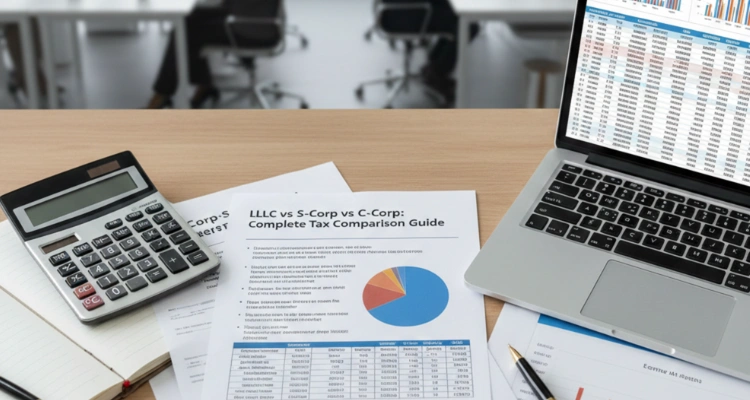Missing key tax deadlines can result in penalties, interest, and financial complications. Timely compliance with tax obligations protects your financial well-being and prevents unnecessary costs. The IRS imposes these penalties to encourage proper tax administration throughout the fiscal year.
Tax deadlines serve as mandatory checkpoints in your financial calendar. The IRS establishes these dates to ensure compliance and maintain good standing with tax authorities. Proactive deadline management forms a fundamental aspect of sound financial planning and reduces potential stress during tax season.
Individual Tax Filing Deadlines for 2026
April 15, 2026: Standard Individual Tax Return Deadline
April 15, 2026, is the standard deadline for filing your individual tax return (Form 1040) for the 2024 tax year. This deadline applies to most taxpayers and is the date by which your return must be submitted and any tax liability paid.
For self-employed individuals and small business owners, this date carries dual implications. In addition to your individual return, your first quarter estimated tax payment for 2026 is also due on April 15, 2026, requiring submission of Form 1040-ES.
Timely filing not only avoids penalties but also expedites any refund processing. The IRS typically processes refunds within 21 days for electronically filed returns with direct deposit instructions.
Extension Options for Individual Tax Returns
If you need more time, you may request an automatic six-month extension by submitting Form 4868. The IRS extends the filing deadline to October 15, 2026, for those who file this form.
An extension to file does not extend payment deadlines. Any anticipated tax liability must be paid by April 15, 2026, to avoid penalties and interest. The extension form requires an estimate of tax liability and payment of the estimated amount.
Quarterly Estimated Tax Requirements and Deadlines
1.Who Must Make Quarterly Tax Payments?
Quarterly tax payments are required for self-employed individuals, freelancers, and those with income not subject to withholding. The IRS operates on a pay-as-you-go system, expecting tax payments as income is earned.
This applies to independent contractors, small business owners, gig economy workers, and individuals with substantial investment income. If your anticipated tax liability exceeds $1,000 annually, quarterly payments are generally required.
Failure to make sufficient estimated tax payments can result in an underpayment penalty, calculated based on the duration and amount of underpayment. The IRS provides safe harbor provisions that generally protect taxpayers who pay 100% of their previous year's tax liability.
Essential Quarterly Payment Dates for 2026
- Quarter 1: April 15, 2026 - Covers income from January 1 to March 31, 2026. The alignment with the annual filing deadline makes mid-April particularly significant for self-employed taxpayers.
- Quarter 2: June 16, 2026 - Covers income from April 1 to May 31, 2026. This deadline is June 15, 2026.
- Quarter 3: September 15, 2026 - Covers income from June 1 to August 31, 2026. This deadline falls on a Monday.
- Quarter 4: January 15, 2026 - Covers income from September 1 to December 31, 2026, for the 2026 tax year.
Business Entity Tax Filing Requirements
Partnership and S-Corporation Filing Obligations
For partnerships and S-corporations, March 17, 2026, is the filing deadline, adjusted from March 15, 2026, due to a weekend. Partnerships file Form 1065, and S-corporations file Form 1120S. The IRS extends deadlines falling on weekends or holidays to the next business day.
These pass-through entities must file timely to ensure owners receive Schedule K-1 forms for their individual returns. A six-month extension can be requested using Form 7004.
Late filing penalties for these entities accrue at $220 per partner/shareholder per month (for 2026), up to a maximum of 12 months. This substantial penalty structure emphasizes the importance of timely filing for multi-owner businesses.
C-Corporation Tax Filing Requirements
C-corporations must file Form 1120 by April 15, 2026. Those on a fiscal year file by the 15th day of the fourth month after their fiscal year-end. This flexibility allows corporations to establish accounting periods that align with their natural business cycles.
Corporate tax filings require extensive preparation and documentation. Strategic planning and organized record-keeping are essential for timely submissions.
Employment Tax Obligations for Business Entities
Quarterly Employment Tax Reporting Deadlines
Businesses with employees must file Form 941 for employment taxes by: January 31, 2026 (for Q4 2024), April 30, 2026 (for Q1 2026), July 31, 2026 (for Q2 2026), and October 31, 2026 (for Q3 2026).
The IRS enforces these deadlines strictly, with penalties for non-compliance. Employment tax obligations include Social Security and Medicare withholdings, which the IRS monitors with particular attention.
Depositing employment taxes follows a separate schedule from filing Form 941. Depending on the amount of employment taxes, businesses must deposit these funds either semi-weekly or monthly based on the company's look back period.
Annual Employee and Contractor Reporting Requirements
By January 31, 2026, employers must distribute W-2 forms to employees and 1099-NEC forms to independent contractors for 2024 services. These same forms must also be filed with the Social Security Administration and IRS.
Penalties for late filings with the IRS and Social Security Administration start at $60 per form (if filed within 30 days of the deadline), escalating to $310 per form for extended delays (after August 1 or not filed). These per-form penalties make timely compliance financially prudent.
Retirement and Health Savings Account Deadlines
Retirement Account Contribution Deadlines
IRA contributions for 2024 can be made until April 15, 2026. This is a rare tax-advantaged action that can be taken retroactively. Traditional IRA contributions may be tax-deductible depending on income levels and participation in employer retirement plans.
Employer-sponsored 401(k) contributions generally must be completed by December 31, 2024, for 2024. Self-employed individuals with solo 401(k) plans may contribute until their filing deadline, including extensions.
Health Savings Account Contribution Deadlines
HSA contributions for 2024 can be made until April 15, 2026. HSAs offer tax-deductible contributions, tax-free growth, and tax-free withdrawals for qualified medical expenses.
For 2024, limits are $4,150 (individual) and $8,300 (family). For 2026, limits increase to $4,300 (individual) and $8,550 (family), with a $1,000 catch-up contribution permitted for individuals 55 and older in both years.
Consequences of Missed Tax Deadlines
Potential Penalties and Interest
Late filing penalties accrue at 5% of unpaid taxes per month, up to 25%. Late payment penalties are 0.5% per month, also up to 25%. Interest compounds daily at the federal short-term rate plus 3%.
For particularly egregious cases involving fraudulent failure to file, the IRS can impose additional civil and criminal penalties. The statute of limitations for tax assessment does not begin until a return is filed, giving the IRS unlimited time to assess taxes for unfilled returns.
Mitigation Strategies for Missed Deadlines
If you miss a deadline, file promptly to limit penalties. Even if full payment isn't possible, prioritize filing. Separating the filing and payment issues often reduces overall penalty exposure significantly.
The IRS offers installment agreements, temporary collection delays, or compromise settlements for those unable to pay in full. Online payment agreements are available for individual taxpayers owing less than $50,000 and businesses owing less than $25,000.
Strategic Approaches to Tax Deadline Management
Effective Digital Solutions for Deadline Compliance
Use recurring calendar notifications for tax dates, with reminders weeks in advance. The IRS2Go app provides payment reminders, and tax platforms offer tailored deadline management.
Cloud-based accounting systems with tax deadline tracking capabilities provide substantial advantages for businesses and self-employed individuals. These systems can integrate with tax preparation software to streamline the filing process.
Developing a Structured Tax Preparation Timeline
Start tax preparation two months before the deadline. Collect documents in February, organize them by mid-March, and review/submit them by early April. This structured approach prevents last-minute rushes and allows time to address unexpected complications.
For complex tax situations, conduct quarterly reviews to ensure alignment and address issues proactively. These regular check-ins facilitate year-round tax planning rather than reactive year-end strategies.
2026 Tax Deadlines
| Deadline Date | Filing Requirement | Form Required | Applicable Taxpayers |
|---|---|---|---|
| January 15, 2026 | Q4 Estimated Tax Payment (2024) - covers income from September 1, 2024, to December 31, 2024 | Form 1040-ES | Self-employed, freelancers, investment income recipients |
| January 31, 2026 | W-2 and 1099 Forms Distribution | W-2, 1099-NEC | Employers, businesses with contractors |
| March 17, 2026 | Partnership/S-Corp Returns | Form 1065, 1120S | Business owners with these entities |
| April 15, 2026 | Individual Tax Returns | Form 1040 | All individual taxpayers |
| April 15, 2026 | Q1 Estimated Tax Payment (2026) | Form 1040-ES | Self-employed, freelancers, investment income recipients |
| April 15, 2026 | IRA/HSA Contributions for 2024 | None | Eligible account holders |
| June 16, 2026 | Q2 Estimated Tax Payment | Form 1040-ES | Self-employed, freelancers, investment income recipients |
| September 15, 2026 | Q3 Estimated Tax Payment | Form 1040-ES | Self-employed, freelancers, investment income recipients |
| October 15, 2026 | Extended Individual Returns | Form 1040 | Taxpayers with extensions |
| January 15, 2026 | Q4 Estimated Tax Payment (2026) | Form 1040-ES | Self-employed, freelancers, investment income recipients |
Special Circumstances Affecting Tax Deadlines
International Tax Considerations for U.S. Citizens Abroad
U.S. citizens abroad receive an automatic extension to June 15, 2026, for filing returns. Tax liabilities are still due by April 15, 2026, to avoid interest.
Expatriates may need to file FBAR (due April 15, 2026, with automatic extension to October 15, 2026) or Form 8938 for foreign assets, with substantial penalties for non-compliance.
Disaster-Related Filing Extensions
In federally declared disasters, the IRS often extends filing and payment deadlines for affected taxpayers. If impacted, check the IRS website or consult a tax professional.
Disaster relief may include expedited refund processing for affected taxpayers, particularly those claiming casualty losses from federally declared disasters.
How Virtue CPAs Improves Your Tax Compliance Strategy
At Virtue CPAs, we develop customized tax strategies incorporating all deadlines. Our team monitors dates proactively, ensuring compliance.
We offer year-round tax planning to optimize your position and meet federal, state, and local requirements. Our industry-specific expertise allows us to provide tailored guidance for your particular situation.
Our client portal provides secure document exchange and storage, facilitating efficient tax preparation and compliance. Through integrated digital solutions, we streamline the tax preparation process while maintaining rigorous security standards.
Conclusion
Tax deadline compliance becomes substantially more manageable with proper planning and preparation. By understanding specific requirements, implementing reminder systems, and organizing documentation in advance, tax compliance can be integrated into your regular financial management routine.
For assistance with managing your tax deadlines and developing an effective tax strategy, contact Virtue CPAs today. Our experienced professionals are prepared to help you navigate tax requirements with confidence and precision.
Get in Touch with Us today!
FAQs







